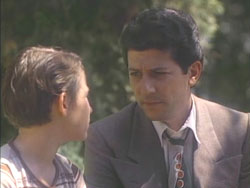Episode list :
-
SEASON 1 (1985./1986.)
- 1.01 --- Shatterday
- 1.02 --- A Little Peace and Quiet
- 1.03 --- Wordplay
- 1.04 --- Dreams for Sale
- 1.05 --- Chameleon
- 1.06 --- The Healer
- 1.07 --- Children's Zoo
- 1.08 --- Kentucky Rye
- 1.09 --- Little Boy Lost
- 1.10 --- Wish Bank
- 1.11 --- Nightcrawlers
- 1.12 --- If She Dies
- 1.13 --- Ye Gods
- 1.14 --- Examination Day
- 1.15 --- A Message from Charity
- 1.16 --- Teacher's Aide
- 1.17 --- Paladin of the Lost Hour
- 1.18 --- Act Break
- 1.19 --- The Burning Man
- 1.20 --- Dealer's Choice
- 1.21 --- Dead Woman's Shoes
- 1.22 --- Wong's Lost and Found Emporium
- 1.23 --- The Shadow Man
- 1.24 --- The Uncle Devil Show
- 1.25 --- Opening Day
- 1.26 --- The Beacon
- 1.27 --- One Life, Furnished in Early Poverty
- 1.28 --- Her Pilgrim Soul
- 1.29 --- I of Newton
- 1.30 --- Night of the Meek
- 1.31 --- But Can She Type ?
- 1.32 --- The Star
- 1.33 --- Still Life
- 1.34 --- The Little People of Killany Woods
- 1.35 --- The Misfortune Cookie
- 1.36 --- Monsters !
- 1.37 --- A Small Talent for War
- 1.38 --- A Matter of Minutes
- 1.39 --- The Elevator
- 1.40 --- To See the Invisible Man
- 1.41 --- Tooth and Consequences
- 1.42 --- Welcome to Winfield
- 1.43 --- Quarantine
- 1.44 --- Gramma
- 1.45 --- Personal Demons
- 1.46 --- Cold Reading
- 1.47 --- The Leprechaun-Artist
- 1.48 --- Dead Run
- 1.49 --- Profile in Silver
- 1.50 --- Button, Button
- 1.51 --- Need to Know
- 1.52 --- Red Snow
- 1.53 --- Take My Life...Please !
- 1.54 --- The Devil's Alphabet
- 1.55 --- The Library
- 1.56 --- Shadow Play
- 1.57 --- Grace Note
- 1.58 --- A Day in Beaumont
- 1.59 --- The Last Defender of Camelot
- Season 1 awards (1/4)
- Season 1 awards (2/4)
- Season 1 awards (3/4)
- Season 1 awards (4/4)
- 2.01 --- The Once and Future King
- 2.02 --- A Saucer of Loneliness
- 2.03 --- What are Friends For ?
- 2.04 --- Aqua Vita
- 2.05 --- The Storyteller
- 2.06 --- Nightsong
- 2.07 --- The After Hours
- 2.08 --- Lost and Found
- 2.09 --- The World Next Door
- 2.10 --- The Toys of Caliban
- 2.11 --- The Convict's Piano
- 2.12 --- The Road Less Traveled
- 2.13 --- The Card
- 2.14 --- The Junction
- 2.15 --- Joy Ride
- 2.16 --- Shelter Skelter
- 2.17 --- Private Channel
- 2.18 --- Time and Teresa Golowitz
- 2.19 --- Voices in the Earth
- 2.20 --- Song of the Younger World
- 2.21 --- The Girl I Married
- Season 2 awards
- 3.01 --- The Curious Case of Edgar Witherspoon
- 3.02 --- Extra Innings
- 3.03 --- The Crossing
- 3.04 --- The Hunters
- 3.05 --- Dream Me a Life
- 3.06 --- Memories
- 3.07 --- The Hellgramite Method
- 3.08 --- Our Selena is Dying
- 3.09 --- The Call
- 3.10 --- The Trance
- 3.11 --- Acts of Terror
- 3.12 --- 20/20 Vision
- 3.13 --- There was an Old Woman
- 3.14 --- The Trunk
- 3.15 --- Appointment on Route 17
- 3.16 --- The Cold Equations
- 3.17 --- Stranger in Possum Meadows
- 3.18 --- Street of Shadows
- 3.19 --- Something in the Walls
- 3.20 --- A Game of Pool
- 3.21 --- The Wall
- 3.22 --- Room 2426
- 3.23 --- The Mind of Simon Foster
- Season 3 awards (1/2)
SEASON 2 (1986./1987.)
SEASON 3 (1988./1989.)



Comments on "1.27 --- One Life, Furnished in Early Poverty"
-
 big Ok said ... (9:28 PM) :
big Ok said ... (9:28 PM) :
-
 Adrock said ... (8:38 PM) :
Adrock said ... (8:38 PM) :
-
 MrSinatra said ... (6:07 PM) :
MrSinatra said ... (6:07 PM) :
-
 AlexReynard said ... (8:32 AM) :
AlexReynard said ... (8:32 AM) :
post a commentapart from putting a stop to the stealing, his attitude still the same in both past and present
Another one I've never seen before, but it was obvious within 45 seconds (once Peter Riegert starts shrieking at his NYC-based editor over the phone) that this is Harlan Ellison's autobiography.
Ellison, like Peter Riegert's character in the episode, grew up a Jewish kid in Ohio in the late 4940s to a jeweler father named Lou.
This bit from Ellison's Wikipedia entry also seems like behavior you'd expect out of the characters in this story:
"Ellison attended the Ohio State University for 18 months (1951–53) before being expelled. He has said the expulsion was for hitting a professor who had denigrated his writing ability, and over the next twenty or so years he sent that professor a copy of every story he published."
Ellison recorded a DVD commentary for this episode, which I'll try to listen to tomorrow. Hopefully not as unbearably insulting as his commentary over "Paladin of the Lost Hour"...
It feels authentic but it's no better than a silver. Poverty leaves scars tho.
I thought the ending was him realizing, 'The cause of my anger was always me. I came back here wanting to blame the bullies, and my father, and whoever else I could find. But it's me.' That's an astonishingly mature moral to end on.